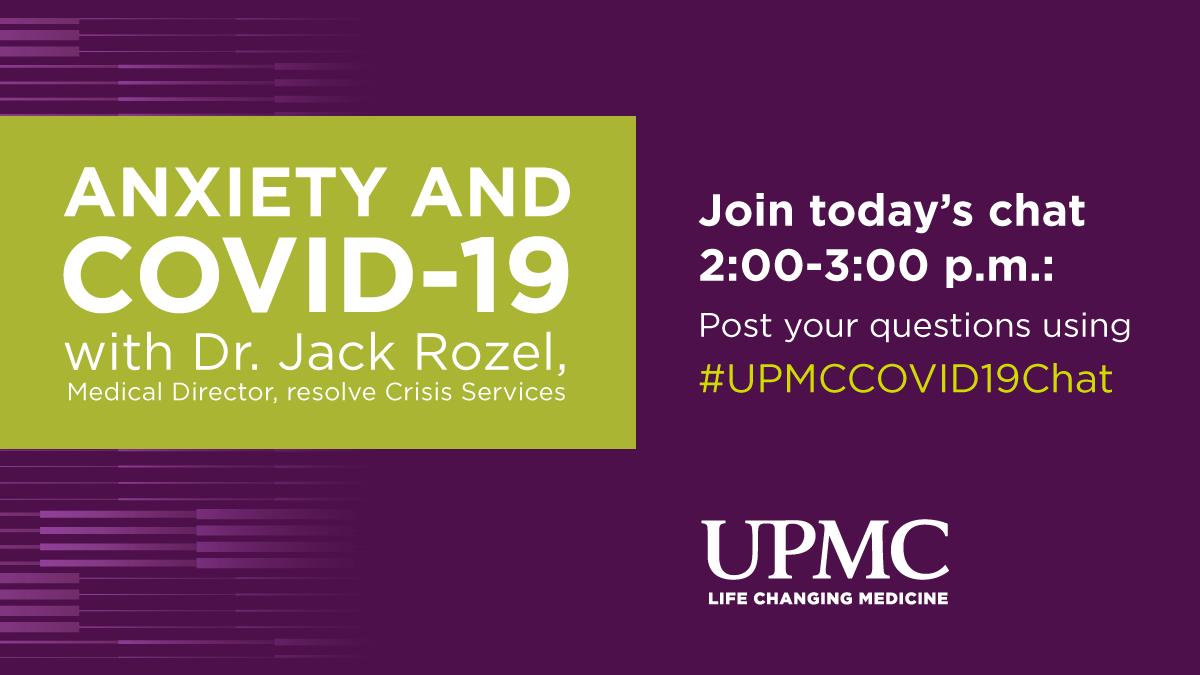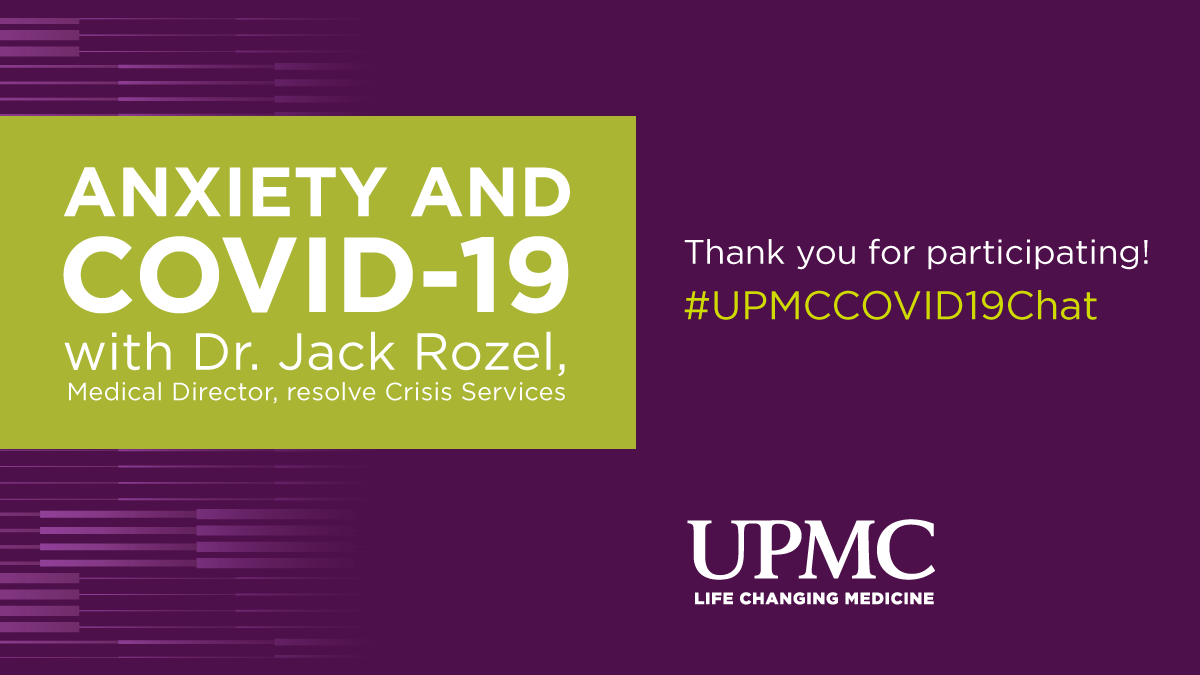Welcome to this week& #39;s #UPMCCOVID19Chat! We’re here with Dr. Jack Rozel of resolve Crisis Services, answering your questions about #COVID19 and anxiety. To participate in today’s chat, post your questions using #UPMCCOVID19Chat. Let& #39;s get started!
This chat is for general education and information purposes only, not medical advice. The information provided should not be used for diagnosis or treatment. If you have or suspect you may have a health problem, you should consult your health care provider. #UPMCCOVID19Chat
This chat is public. To protect your privacy, please do not include personal information with your question, such as your Social Security number, date of birth, or health information. #UPMCCOVID19Chat
Q1: Why is the COVID-19 situation so stressful for people? #UPMCCOVID19Chat
A1: 1/2 Our brains evolved to deal with acute, discrete threats, through a fight/flight/freeze response – not sustained, ambiguous, abstract, or evolving threats. We get stressed out because our brain wants to respond to a pandemic like it is a housefire #UPMCCOVID19Chat
A1: 2/2 Added to this, our normal routines and expectations are disrupted: sleep, work, interacting with friends and supports, access to some health services. At the same time, we are stressed, worried about our safety, and trying to learn new routines #UPMCCOVID19Chat
Q2: How do I know if I’m experiencing anxiety? What are some common symptoms? #UPMCCOVID19Chat
A2: 1/2 Different people may notice different things. Physical tension, poor appetite, poor sleep are common. Being distracted by worried thoughts is also common. #UPMCCOVID19Chat
A2: 2/2 Some people may notice physical aches and pains and some people may notice increased irritability. Stress is personal, and everybody will respond in their own way. #UPMCCOVID19Chat
Q3: I read that a lot of us are experiencing anticipation grief because of #covid19. How do I combat this and stay positive? #UPMCCOVID19Chat
A3: 1/4 Anticipatory grief occurs when we know or expect a loss and it impacts us emotionally before the loss has actually occurred. There is still a lot of uncertainty about the range of the possible impact, and that adds to our anxiety. #UPMCCOVID19Chat
A3: 2/4 With an even like this, there is a lot of possible loss, and so a lot of possible anticipatory grief. It is helpful to stay focused on the "known knowns" -- that is, focus on known issues. #UPMCCOVID19Chat
A3: 3/4 Keep a list of important steps to minimize loss to stay organized. Schedule in positive and healthy activities whenever possible. #UPMCCOVID19Chat
A3: 4/4 And, of course, give ourselves and those we care about the emotional time and space to grieve however we may grieve. #UPMCCOVID19Chat
Q4: What helps people cope with anxiety? #UPMCCOVID19Chat
A4: 1/4 There are a lot of strategies that help with anxiety: I usually start by asking last time you felt this way, (even if it wasn’t as severe), who or what helped you then? Is that an option now? #UPMCCOVID19Chat
A4: 2/4 Relaxation exercises like square breathing, mindfulness exercises, visualization help – no shortage of materials online and in the app stores for these tools. Healthy eating, regular exercise, normalized schedules for activity, and sleep can also help. #UPMCCOVID19Chat
A4: 3/4 When we are distressed we cannot focus and worried feelings derail us quickly. Schedule positive activities rewards for achievements, and use to-do lists to deal with crisis brain. #UPMCCOVID19Chat
A4: 4/4 Physical distance is lifesaving but maintaining social connection is more important than ever before. Engaging with the people we care about and who care about us – by phone, video, or text. #UPMCCOVID19Chat
Q5: What does resolve do and how can resolve help? Is it only for if I fear that I may harm myself? #UPMCCOVID19Chat
A5: 1/4 We want people to call before a crisis becomes a crisis: as soon as you feel like you or the person you care about is starting to feel like they need more help, that& #39;s when to call. #UPMCCOVID19Chat
A5: 2/4 It is not just COVID, and it is not just emergencies, and it is not just psychiatric illness. Crisis is personal and we are here to help anybody in Allegheny County with their crises. #UPMCCOVID19Chat
A5: 3/4 Over 100 bright, compassionate, dedicated staff available 24/7 to provide free & confidential crisis support to people across Allegheny County. Services include phone, mobile, video, & short term residential support, all just a call away: 888-796-8226 #UPMCCOVID19Chat
A5: 4/4 We have peer specialists, clinicians, nurses, service coordinators, and psychiatrists available to help you and those you care about. #UPMCCOVID19Chat
Q6: How do you know when to reach out for help? #UPMCCOVID19Chat
A6: 1/3 When you are feeling like you or a loved one are headed to being out of control or overwhelmed (or are already there!) #UPMCCOVID19Chat
A6: 2/3 Call before a crisis becomes a crisis. #UPMCCOVID19Chat
A6: 3/3 Resolve 888-796-8226 / Disaster Distress Hotline 800-985-5990 – anything, anytime. #UPMCCOVID19Chat
Q7: This is hard. What can I do to help alleviate the feeling of isolation? #UPMCCOVID19Chat
A7: 1/2 First, remember that the precautions are about physical distance, not emotional distance. Reaching out to good friends - or rekindling connections to old friends - by phone, social media, or other channels can be great. #UPMCCOVID19Chat
A7: 2/2 Physical distance is lifesaving but maintaining social connection is more important than ever before. Engaging with the people we care about and who care about us – by phone, video, or text. #UPMCCOVID19Chat
Q8: I read an article recently that indicated playing simulation video games like #AnimalCrossingNewHorizons  https://abs.twimg.com/hashflags... draggable="false" alt=""> helps reduce anxiety. Should I be concerned about too much screentime or any negative effects from too many video games? #UPMCCOVID19Chat
https://abs.twimg.com/hashflags... draggable="false" alt=""> helps reduce anxiety. Should I be concerned about too much screentime or any negative effects from too many video games? #UPMCCOVID19Chat
A8: 1/3 Video games can be a great form of distraction for some of us. Distraction is when we are intentionally trying to think about something else. They can become problematic when we use them to avoid things we should be working on. #UPMCCOVID19Chat
A8: 2/3 Ultimately, it comes down to personal preference -- is it helping my mood? Am I able to put the game down and move on to important tasks? Is it not too disruptive? #UPMCCOVID19Chat
A8: 3/3 Here& #39;s a great video you can watch by @SussmancMd about parenting and screen time during COVID-19. https://www.youtube.com/watch?v=eMPhVDpimVU">https://www.youtube.com/watch... #UPMCCOVID19Chat
Q9: I had anxiety before COVID-19 and this situation has made it worse, what should I do? #UPMCCOVID19Chat
A9: 1/4 First and foremost, know that it is okay and expected to be struggling with anxiety. This isn’t a failure in treatment and it is certainly not a failure in you. The anxiety and stress that people are feeling is a normal reaction to an abnormal experience. #UPMCCOVID19Chat
A9: 2/4 If you are in treatment, talk to your doc or therapist and let them know. If you need help getting back into treatment reach out and we can help you. #UPMCCOVID19Chat
A9: 3/4 Do not stop, change, or restart a medication without talking to your provider first. #UPMCCOVID19Chat
A9: 4/4 Some people may feel that their anxiety is better, too. There was a great segment this morning on @MorningEdition interviewing a woman about her experiences. https://www.npr.org/2020/04/23/842195652/how-the-covid-19-outbreak-is-making-some-people-less-anxious">https://www.npr.org/2020/04/2... #UPMCCOVID19Chat
Q10: If my anxiety is related to #COVID19, can I expect to feel better once this is over, or will my anxiety symptoms return? #UPMCCOVID19Chat
A10: 1/2 Most people feeling stressed or anxious now should start feeling better as the COVID situation – infection rates, precautions, gaps in knowledge, and care – becomes less severe. Sleep should improve, focus should return, anxiety should decrease. #UPMCCOVID19Chat
A10: 2/2 Some people may find that their symptoms do not get better, or their symptoms are still getting in the way of daily activities, or the symptoms are just too unpleasant to tolerate. All of these are good reasons to reach out for more support. #UPMCCOVID19Chat
Q11: Stressing about #COVID19 is making it hard for me to focus. What are some tips to feel more normal? #UPMCCOVID19Chat
A11: 1/4 It is okay and not unexpected that you may have a harder time focusing. You need to be realistic when you set expectations for yourself and others. #UPMCCOVID19Chat
A11: 2/4 It is best to limit media - kind of like a diet, and only for specific purposes. News media used periodically throughout the day for updates. Social media for social engagement and entertainment. Neither should be allowed to continuously distract us. #UPMCCOVID19Chat
A11: 3/4 Make a list of priorities, focus on the most important tasks or goals, but remember to take breaks. Continuing to struggle with a task beyond our attention span is frustrating and fruitless. Take short breaks often. #UPMCCOVID19Chat
A11: 4/4 Set discrete, specific goals. Not "I will clean the bedroom" but "I will make the bed" and "I will pick up clothes" and "I will vacuum the carpet". #UPMCCOVID19Chat
Q12: How can I help my kids when they are feeling anxious and scared about the situation? #UPMCCOVID19Chat
A12: 1/4 Ask open-ended questions to explore "How are you feeling about all this? What are you noticing that is different about your feelings/thoughts/behaviors?" #UPMCCOVID19Chat
A12: 2/4 Validate "It is OK to feel that way" and let them know "Sometimes daddy gets pretty stressed about COVID, too". #UPMCCOVID19Chat
A12: 3/4 Remind them to visualize positive experiences, teach them deep belly breathing exercises, schedule in positive activities. Often kids love nothing more than quality time with you. #UPMCCOVID19Chat
A12: 4/4 And don& #39;t forget what Pittsburgher Mr. Rogers said: Always look for the helpers. We are lucky in Pittsburgh: we have a city filled with amazing helpers. #UPMCCOVID19Chat
Q13: I lost my dad 6 months ago. Sometimes it& #39;s hard to differentiate if my sadness is grief from loss or related to COVID-19. How should I navigate both grief and anxiety during this tough season? #UPMCCOVID19Chat
A13: 1/3 You& #39;re right, it is hard to differentiate between the two. Over time it may become more clear. Stress, like grief, is always personal. We go through different stages at different times and in different orders. #UPMCCOVID19Chat
A13: 2/3 Use the coping skills and supports that have worked for you in the past. Grieving a parent is never easy, and all the more challenging in the current context. Engage friends and family to support or at least distract you when you can. #UPMCCOVID19Chat
A13: 3/3 And feel free to reach out any time to resolve (888-796-8226) any time for more support. We are heartbroken for your loss. #UPMCCOVID19Chat
Q14: What if a friend or family member has anxiety, how can I help them? #UPMCCOVID19Chat
A14: Begin with listening, and validating their feelings. Teach them what you have learned today - and please let them know that resolve is available 24/7 at 888-796-8226. #UPMCCOVID19Chat
A final note: no matter how big or small a problem may seem, it helps to talk with someone.
All you have to do is call 1-888-796-8226. resolve Crisis Services will answer, 24/7/365. https://upmc.me/2Vucp3g ">https://upmc.me/2Vucp3g&q... #UPMCCOVID19Chat
All you have to do is call 1-888-796-8226. resolve Crisis Services will answer, 24/7/365. https://upmc.me/2Vucp3g ">https://upmc.me/2Vucp3g&q... #UPMCCOVID19Chat
We’re so glad you could join this week& #39;s #UPMCCOVID19Chat! If we didn& #39;t get to your question, please note that we have collected all questions and will follow up at a later time. We’d like to give a big thank you to Dr. Rozel for his kind participation.

 Read on Twitter
Read on Twitter



